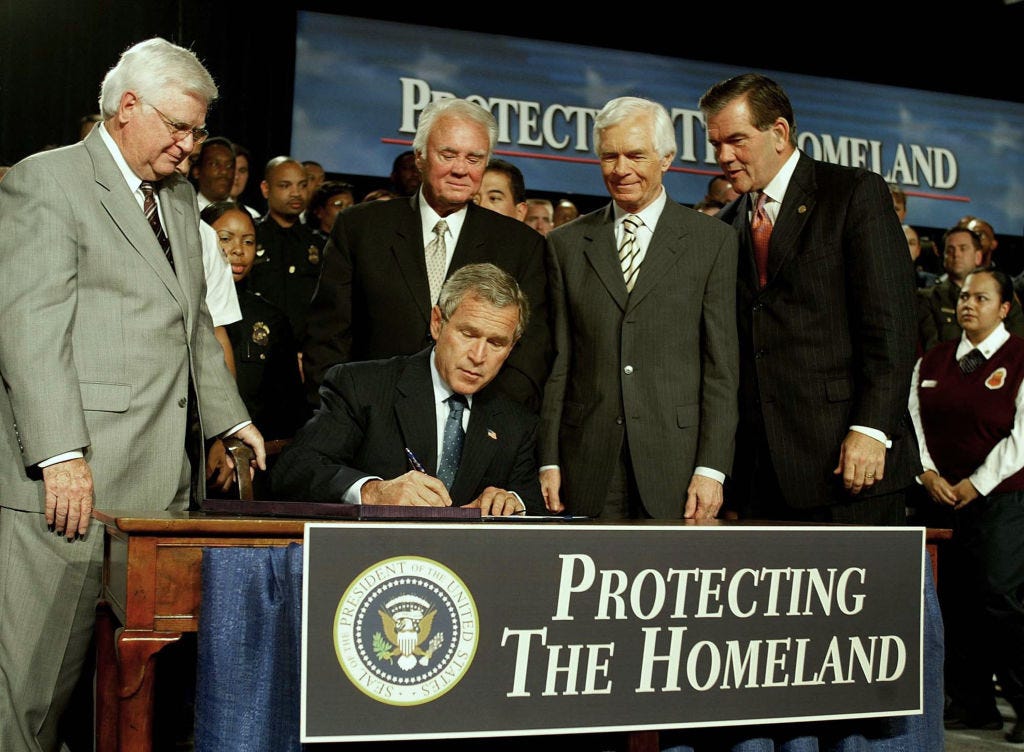Democrats Once Opposed the Post-September 11th Expansion of the Surveillance State
The Dept. of Homeland Security, once viewed as an Orwellian power grab, is now championed by Democrats to police “dangerous” political speech.
In the wake of the September 11th terror attacks, President George W. Bush created the Department of Homeland Security, a new sprawling federal agency with over 170,000 employees and new intelligence powers dedicated to domestic national security.
At the inception of this agency, Democratic lawmakers challenged its authority and raised concerns that this consolidation of government power would jeopardize civil liberties.
Senator Russ Feingold, D-Wisc., led the opposition. Feingold criticized the formation of DHS, stating it came "at the expense of unnecessarily undermining our privacy rights" and "weakening protections against unwarranted government intrusion into the lives of ordinary Americans."
Representative Chris Bell, D-Tex., fumed at the agency and warned against the creation of an "Orwellian surveillance state" that would be used to settle “partisan political” disputes.
Civil libertarian opposition once held sway within the party. Democrats worked closely with the ACLU and other privacy groups to question DHS powers, particularly around data mining, surveillance, and interference into domestic politics.
The fear that the newly created agency would weaponize homeland security concerns to advance partisan politics quickly materialized in the 2004 elections. Tom Ridge, after serving as the head of the agency, wrote that the Bush administration officials pressured him to raise the DHS terror threat level just before voting got underway in a bid to influence the electoral outcome.
Even as recently as 2012, House Democrats raised concerns in Congress about DHS violating American civil rights and privacy rights by inappropriately monitoring First Amendment-protected speech on social media. "I am looking forward to learning from the witnesses exactly how DHS uses social media and what DHS is doing to make sure that in its use of social media, it is not being perceived as being a Big Brother," said Representative Jackie Speier, D-Calif., during an oversight hearing over the Department of Homeland Security’s social media surveillance efforts.
But as the threat of Islamic terror attacks has diminished, the Department of Homeland Security has pivoted and recalibrated its reach, finding new political support for its growth.
Twenty years after its creation, the agency is vastly expanded. The agency went from a $46 billion budget in 2003 to a $103 billion budget today, with now over 260,000 global employees. Alongside its growing size is a new focus on social media companies and a mandate against allowing dangerous tweets and Instagram posts, which DHS claims undermines “our democratic institutions and national cohesiveness.”
Just as the scope of DHS has shifted, so has the partisan response. The Democratic Party is now the greatest champion of agency expansion, and most congressional voices raising concerns about the agency violating civil liberties are members of the GOP.
What happened?
That change in focus came after widespread fears that Russia had somehow manipulated social media to elect Donald Trump in 2016. In reality, Russia spent only about $100,000 in online political advertising, with much of it devoted to hyping both left-wing and right-wing activist groups, and little devoted to boosting Trump. For perspective, that amount of Russian online disinformation advertising was 0.001538% of the $6.5 billion spent that year, the equivalent of a drop of water in a vast political swamp.
But the media frenzy convinced many that the government needed to do more to control social media, and the much-hyped Russian involvement elevated the issue into a national security threat. In one of its last acts in office on DHS policy, the Obama administration designated “election infrastructure” as a critical form of infrastructure under the purview of the agency, alongside pipelines, utilities, chemical plants, and other forms of traditional infrastructure, setting the stage for DHS to begin formulating its censorship apparatus.
In response to the new mandate to shape online discourse, DHS bureaucrats have worked closely with Facebook, Google and the social media site formerly known as Twitter to discourage supposed misinformation, disinformation, and “malinformation” – the DHS term of art that describes factual information fueling dangerous narratives. This push has led to the censorship of broad swaths of American political expression, particularly around COVID-19 policies and election-related content.
During the 2020 election, DHS sponsored an elaborate system in which the FBI, intelligence officials, NGOs and representativees from the major tech platforms attended "weekly teleconferences" to coordinate ways to "counter election-related disinformation." In many cases, that meant FBI and DHS agents clamping down on Americans simply airing concerns about election integrity.
As I’ve reported here on this Substack, despite the heavy-headed involvement of the government, the push was nakedly partisan. The main DHS portal for reporting disinformation was led by liberal advocacy groups and financed by a billionaire Biden campaign donor. The effort largely flagged Republican tweets for removal, while ignoring Democratic tweets with essentially identical content.
DHS officials have discussed expanding the scope of its alerts to social media companies, with a focus on suppressing certain forms of content around politically sensitive topics, such as the war in Ukraine and “racial justice.”
These topics are areas of unsettled truth subject to intense debate. What one American considers misinformation around Ukraine and racial justice another could see as perfectly reasonable. Why a national security-focused government agency created in the aftermath of September 11th sees it as its role to adjudicate such areas of open discourse is even more mystifying.



